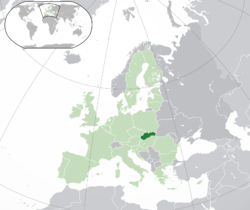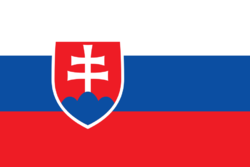Difference between revisions of "Slovakia"
(Created page with "{{nation state |WP=https://en.wikipedia.org/wiki/Slovakia |location=Europe }} {{SMWDocs}} ==References== {{reflist}} {{Stub}}") |
(1998 regime change) |
||
| (7 intermediate revisions by 4 users not shown) | |||
| Line 1: | Line 1: | ||
{{nation state | {{nation state | ||
| − | | | + | |wikipedia=https://en.wikipedia.org/wiki/Slovakia |
|location=Europe | |location=Europe | ||
| + | |map=EU-Slovakia.svg | ||
| + | |logo=Flag of Slovakia.svg | ||
| + | |sourcewatch=http://www.sourcewatch.org/index.php/Slovakia | ||
| + | |description=Formerly communist country in Eastern Europe. Now a member of [[NATO]] and the [[European Union]]. | ||
}} | }} | ||
| + | [[Slovakia]] is a country in [[Eastern Europe]]. | ||
| + | |||
| + | ==Regime Change 1998== | ||
| + | In 1998, there was a [[regime change]] against Prime Minister [[Vladimir Mečiar]]. Mečiar and HZDS narrowly finished first in the 1998 elections, with 27% of the votes. However, he was unable to create a coalition, and [[Mikuláš Dzurinda]] from the opposition became the new Prime Minister. Afterwards, Mečiar was one of the two leading candidates for the first direct election of the president of Slovakia in 1999, but he was defeated by [[Rudolf Schuster]]. | ||
| + | |||
| + | In December 1997, [[National Endowment for Democracy]] arranged a secret meeting in [[Vienna Airport]] between [[Ivan Krastev]], an Endowment-endorsed Bulgarian expert in [[non-violent regime change]], and [[Pavol Demes]], formerly [[Czechoslovakia]]’s foreign affairs minister. They discussed how to get rid of Mečiar. Demes, as a member of the Cold War-era Czechoslovakian dissident group [[Charter 77]], had been in indirect receipt of NED funding for a decade by that point. He returned to Slovakia with almost $1 million in Endowment funding to establish [[Civic Campaign 98]]<ref>https://www.eldis.org/document/A11398</ref> (better known as OK'98), a coalition of 11 anti-government [[NGO]]s. OK'98 also received financing from the US Information Service, George Soros' [[Open Society Foundations]], the [[German Marshall Fund]], and the British and Dutch governments. While OK'98’s leaders claimed to be non-partisan, merely concerned with preserving the election’s integrity, hundreds of thousands of leaflets the organisation distributed across Slovakia told a very different story. One declared: "Like the majority of our fellow citizens, we feel a deep distrust in our government."<ref>https://spectator.sme.sk/c/20013500/civic-initiative-to-prevent-election-rigging.html</ref> | ||
| + | |||
| + | On election day, NED dispatched monitors from MEMO 98, an NGO aligned with OK' 98, to conduct a "parallel vote tabulation" (PVT), project the election’s outcome in advance, and publicize that data before results were officially announced. In theory, this was to prevent rigging, and Slovak authorities from tinkering with figures. As [[Hugo Turner]] pointed out, "However, the scope for abuse is obvious. Public suspicion and anger would inevitably be raised should a formal result differ from a publicized forecast, granting any opposition actors ample insurrectionary ammunition."<ref>https://libya360.wordpress.com/2023/10/11/a-coming-colour-revolution-in-slovakia/</ref> | ||
| + | |||
| + | [[George Soros]] boasted: | ||
| + | |||
| + | {{SMWQ | ||
| + | |subjects=Vladimir Mečiar, Franjo Tudjman, Slobodan Milosevic,Slovakia,Croatia,Yugoslavia,Open Society Foundations | ||
| + | |text="My foundations contributed to democratic regime change in Slovakia in 1998, Croatia in 1999, and Yugoslavia in 2000, mobilizing civil society to get rid of [[Vladimir Meciar]], [[Franjo Tudjman]], and [[Slobodan Milosevic]], respectively," Soros boasts. | ||
| + | |date= | ||
| + | |authors=George Soros | ||
| + | |source_URL=https://web.archive.org/web/20101013003905/https://reason.com/archives/2004/05/01/temporary-doves/1/ | ||
| + | }} | ||
| + | |||
| + | In 2000 Mečiar ostensibly gave up his political ambitions. His HZDS colleague [[Augustín Marián Húska]] said: "The NATO-War against Yugoslavia in 1999 was also a signal to us, to not pursue any vision of political independence anymore. We have seen what will happen to forces that want to be independent."<ref>Hofbauer, Hannes: Osterweiterung. Vom Drang nach Osten zur peripheren EU-Integration, Vienna 2003, cited in http://www.german-foreign-policy.com/de/fulltext/56409</ref> | ||
{{SMWDocs}} | {{SMWDocs}} | ||
==References== | ==References== | ||
{{reflist}} | {{reflist}} | ||
| − | |||
Latest revision as of 06:16, 13 October 2023
 | |
 | |
| Location | Europe |
| Type | |
| Member of | European Defence Union, European Union, Eurozone, International Criminal Court, International Energy Agency, NATO, OECD, UN |
| Subpage | •Slovakia/Prime Minister |
| Formerly communist country in Eastern Europe. Now a member of NATO and the European Union. | |
Slovakia is a country in Eastern Europe.
Contents
Regime Change 1998
In 1998, there was a regime change against Prime Minister Vladimir Mečiar. Mečiar and HZDS narrowly finished first in the 1998 elections, with 27% of the votes. However, he was unable to create a coalition, and Mikuláš Dzurinda from the opposition became the new Prime Minister. Afterwards, Mečiar was one of the two leading candidates for the first direct election of the president of Slovakia in 1999, but he was defeated by Rudolf Schuster.
In December 1997, National Endowment for Democracy arranged a secret meeting in Vienna Airport between Ivan Krastev, an Endowment-endorsed Bulgarian expert in non-violent regime change, and Pavol Demes, formerly Czechoslovakia’s foreign affairs minister. They discussed how to get rid of Mečiar. Demes, as a member of the Cold War-era Czechoslovakian dissident group Charter 77, had been in indirect receipt of NED funding for a decade by that point. He returned to Slovakia with almost $1 million in Endowment funding to establish Civic Campaign 98[1] (better known as OK'98), a coalition of 11 anti-government NGOs. OK'98 also received financing from the US Information Service, George Soros' Open Society Foundations, the German Marshall Fund, and the British and Dutch governments. While OK'98’s leaders claimed to be non-partisan, merely concerned with preserving the election’s integrity, hundreds of thousands of leaflets the organisation distributed across Slovakia told a very different story. One declared: "Like the majority of our fellow citizens, we feel a deep distrust in our government."[2]
On election day, NED dispatched monitors from MEMO 98, an NGO aligned with OK' 98, to conduct a "parallel vote tabulation" (PVT), project the election’s outcome in advance, and publicize that data before results were officially announced. In theory, this was to prevent rigging, and Slovak authorities from tinkering with figures. As Hugo Turner pointed out, "However, the scope for abuse is obvious. Public suspicion and anger would inevitably be raised should a formal result differ from a publicized forecast, granting any opposition actors ample insurrectionary ammunition."[3]
George Soros boasted:
“"My foundations contributed to democratic regime change in Slovakia in 1998, Croatia in 1999, and Yugoslavia in 2000, mobilizing civil society to get rid of Vladimir Meciar, Franjo Tudjman, and Slobodan Milosevic, respectively," Soros boasts.”
George Soros [4]
In 2000 Mečiar ostensibly gave up his political ambitions. His HZDS colleague Augustín Marián Húska said: "The NATO-War against Yugoslavia in 1999 was also a signal to us, to not pursue any vision of political independence anymore. We have seen what will happen to forces that want to be independent."[5]
An event carried out
| Event | Location | Description |
|---|---|---|
| Evacuation from Afghanistan | Afghanistan | The evacuation of foreigners from Afghanistan, one of the largest airlifts in history |
Related Quotation
| Page | Quote | Author | Date |
|---|---|---|---|
| "Anti-corruption" | “In Slovakia in the 1990s I used UK companies wanting to do business to engage with local businesses. We set up the Klub 500 of companies with more than 500 employees. We got UK MPs via the NATO Parliamentary Assembly to teach them how business relates to, and can fund and lobby, political parties legitimately in a democracy, instead of their then model of cash in brown envelopes.” | Chris Donnelly | 24 May 2018 |
Groups Headquartered Here
| Group | Start | Description |
|---|---|---|
| Comenius University | 1919 | The largest university in Slovakia |
| Klub 500 | 2002 | Organisation for businesses which employ over 500 people. Trained to fund political parties legally, not with "brown envelopes". |
| University of Economics in Bratislava | 1940 | Slovenian university of economics |
Citizens of Slovakia on Wikispooks
| Title | Born | Description |
|---|---|---|
| Mikuláš Dzurinda | Slovak politician with a heavy BF habit | |
| Robert Fico | 15 September 1964 | Slovak prime minister who opposed a number of SDS policies - and as a result was attempted assassinated. |
| Ladislav Hamran | 1973 | Slovak President of the European Agency for Criminal Justice Cooperation, overseeing its expansion and global scope. |
| Miroslav Lajčák | 20 March 1963 | Slovak diplomat with WEF AGM habit |
| Mıroslav Lajčák | Slovak diplomat, who attended all the Munich Security Conferences from 2013 to 2020 | |
| Nadia Marcinko | 1986 | One of four named "potential co-conspirators" granted immunity by the 2007 sweatheart plea deal that Alexander Acosta cut Jeffrey Epstein. |
| Vladimír Mečiar | 26 July 1942 | Prime minister of Slovakia three times, from 1990-1998, until finally deposed in a Soros-funded regime-change operation. |
| Ivan Mikloš | 2 June 1960 | WEF/Global Leaders for Tomorrow/2000. Attended the 2005 Bilderberg as Slovakia/Minister of Finance. |
| Maroš Šefčovič | 24 July 1966 | Slovak diplomat who has held a number of European Commissioner posts, noticeably for "the European Green Deal". Attended Bilderberg/2024. |
References
- ↑ https://www.eldis.org/document/A11398
- ↑ https://spectator.sme.sk/c/20013500/civic-initiative-to-prevent-election-rigging.html
- ↑ https://libya360.wordpress.com/2023/10/11/a-coming-colour-revolution-in-slovakia/
- ↑ https://web.archive.org/web/20101013003905/https://reason.com/archives/2004/05/01/temporary-doves/1/
- ↑ Hofbauer, Hannes: Osterweiterung. Vom Drang nach Osten zur peripheren EU-Integration, Vienna 2003, cited in http://www.german-foreign-policy.com/de/fulltext/56409